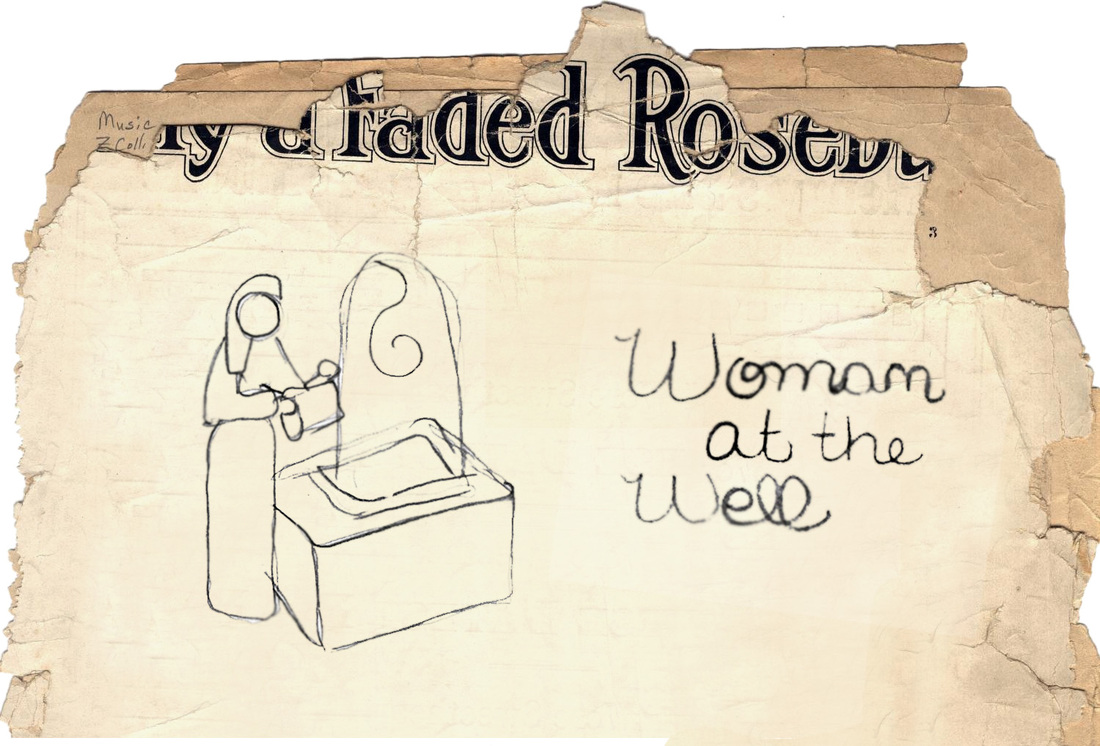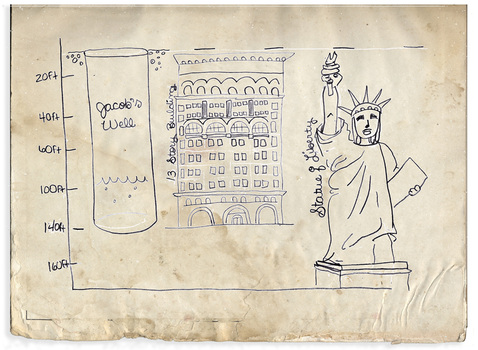|
Reading this scripture, I wanted to meditate on the language of Jesus. I wanted to focus on just how confusing he could be. His mind always seemed to be focused on something other than the worldly. Instead, every step I took to research Jesus in the story opened more doors to the Samaritan woman. I discovered I was running away from her, not because her side of the story isn't intriguing or worthwhile to focus on, but because focusing on the woman in the woman in the well story is clique for a female pastor to take on. This week's scripture is a gold mine for feminist ministers: a Samaritan, already an oppressed group within the Jewish family, and also a female. Females were not exactly held to equal standards back then. It is preached so much because Jesus, the Messiah, speaks to her as an equal. It then turns into a sermon about equality to all no matter what. I am not saying it’s a bad message, I am just saying it is overdone. After last weeks meditation, I really don't want to play into cliques. I found my research was leading me to something else…  Imagine this woman with me. We don’t know too much about her; we don’t even know her name. (BTW- even Job’s daughters in the Old Testament had names.) This nameless woman had a difficult life. She had been married five times and was living with a sixth man she was not married to. Now before you draw conclusions about her character realize something about the time period. It was not her place to initiate marriage or divorce. Her life was in the hands of her family and her husband-to-be. Some historians consider the woman an adulterer, which would be a reason why her husbands continued to divorce. But, if you remember Mary, mother of Jesus, Joseph wanted to divorce her quietly because the punishment for adultery was stoning to death. Now either the woman had five great husbands who all divorced her quietly or perhaps this woman was not an adulterer at all. I believe she wasn't, but I don’t know what could have initiated divorce. A jealous other wife? Bad cooking skills? Being too vocal? Who knows, but it must have left her feeling less than average. It must have made her a point of negative interest in her town. When a woman’s success is based on getting married and having children, this woman was a complete failure. (Hey, we know so little about her, we don’t even know if she has kids.) What was she going to do?  One thing we know she did was avoid others. (Today, we are spoiled. First of all, we don’t live in a desert so water is not difficult to come by. Second, we need not go any further than our own kitchen sink to find it. If we are picky we can go to the grocery store and pick up designer water: water in special bottles, filtered with reverse osmosis, or with a slight fruity flavor added for taste. Like I said, spoiled.) The Samaritan Woman had to go to a well. We know that Jesus was just entering town, so he was probably on the outskirts of Sychar, not in the middle of it. Sychar was big city. (In a way, it's like the capital city for the Samaritans. After all, their place of worship was not far from the city.) The Samaritan woman probably lived more towards the center which means she would have passed one or two wells on the way to the well Jesus was waiting at. Let me push this further. Not only was this woman avoiding wells but also the people who drew water from them. If you were going to do some sort of outdoor chore, what time of day would you choose to do it? This Samaritan woman took her long walk, not in the cool morning or the crisp late afternoon. She went to gather water at high noon, possibly the worst time of day to do anything outdoors. Also, probably the time when there would be as little people as possible going to gather water. Not wanting to be around others this woman could have been ashamed, embarrassed, ostracized… you can put your own thoughts there. What we can pull from her actions is she had a need not to converse or interact with others. Needless to say, this woman was not in a good place. Now before the woman arrives at Jacob’s well, Jesus arrives with the Disciples. They probably had a long walk and Jesus probably was actually thirsty. There was a problem; this was not a shallow well. It wasn’t like he could drop a ladle down into it and pull up water. To give you an idea of how deep this well was, in 1935 an excavation team cleaned out Jacob’s well to find the bottom at 138 ft. A 13 story building would be about that length. The Statue of Liberty, from feet to torch, is only about 20 ft taller. That’s a deep well. So when the woman arrives, in serendipity, with a way to draw water from this very deep well, Jesus asks for some help. Now Jesus is unconcerned about social standing, who is supposed to hate who, or why he should like or dislike this woman. The Messiah comes to this woman not above her, but as her equal, and the woman notices. The woman cares actually. She’s been divorced five times. She is a Samaritan and he is a Jew. She is a woman. By Jewish law she is considered unclean. If Jesus were to drink from her pot he would be considered unclean as well. By trying to talk Jesus out of his request, she is demeaning herself. She is expressing how she really feels. Instead of persisting about actual water Jesus gives her something: self-worth. He told her he was going to give her living water. Now, just to bring in a point from the message I wanted to write but didn't. The word for ‘spring water’ in Hebrew is ‘living water.’ Saying ‘living water’ would not have sounded new or interesting to the woman, just another word for well water. The woman is caught up on the physical needs of the world. She wants living water because it would allow disassociating with the world even more. She would never have to take water from the well again. She could annex herself in her house, choosing not to associate with anyone. However, what Jesus gives her is the opposite, a reason to get out in public again. Through their conversation she goes from being a hermit to an evangelist. She does something spectacular, helping her town believe in Jesus, not because of her history but despite her history. God can take anyone God chooses and change the world. In this case, God took a broken woman.  I don’t know if you know anything about Fanny Crosby. She was a hymnist and an evangelist in the late 1800’s, early 1900’s. She was also blind. She was an amazing woman who did not allow her disability to keep her from what she felt was God’s calling in her life. Earlier in her career she was asked to speak for a group of blue collar workers. During her speech she felt called to help some son who had to be saved that night or not at all. She called out at the end of her speech, “If there is a dear boy here tonight who has perchance wandered away from his mother’s home and his mother’s teaching, would he please meet me after service.” There was a boy who came forward, around 18 years old who wanted to know if she was talking about him. His mother had died and he had promised to meet her in heaven but he was afraid he was going down the wrong path and would never make it. Fanny spent the evening talking with him about Christ. When she got back to her room she penned the lyrics to ‘Rescue the Perishing.’ She would years later recount the story behind the hymn to a group at a YMCA only to have the same man, now much older, come up to her and tell her how she had saved his life. That experience led her towards an evangelistic career. In her 60’s she made the choice to live in poverty in New York’s ghettos. She would spend her evenings visiting a local bar where more than drinking took place. She would go there day after day. She wasn’t going to avoid those in need. She wanted to rescue the perishing.
If you like what you are reading there are many ways to connect:
Connection Board And as always, contributions are greatly appreciated. |
Categories
All
Archives
October 2023
|





 RSS Feed
RSS Feed